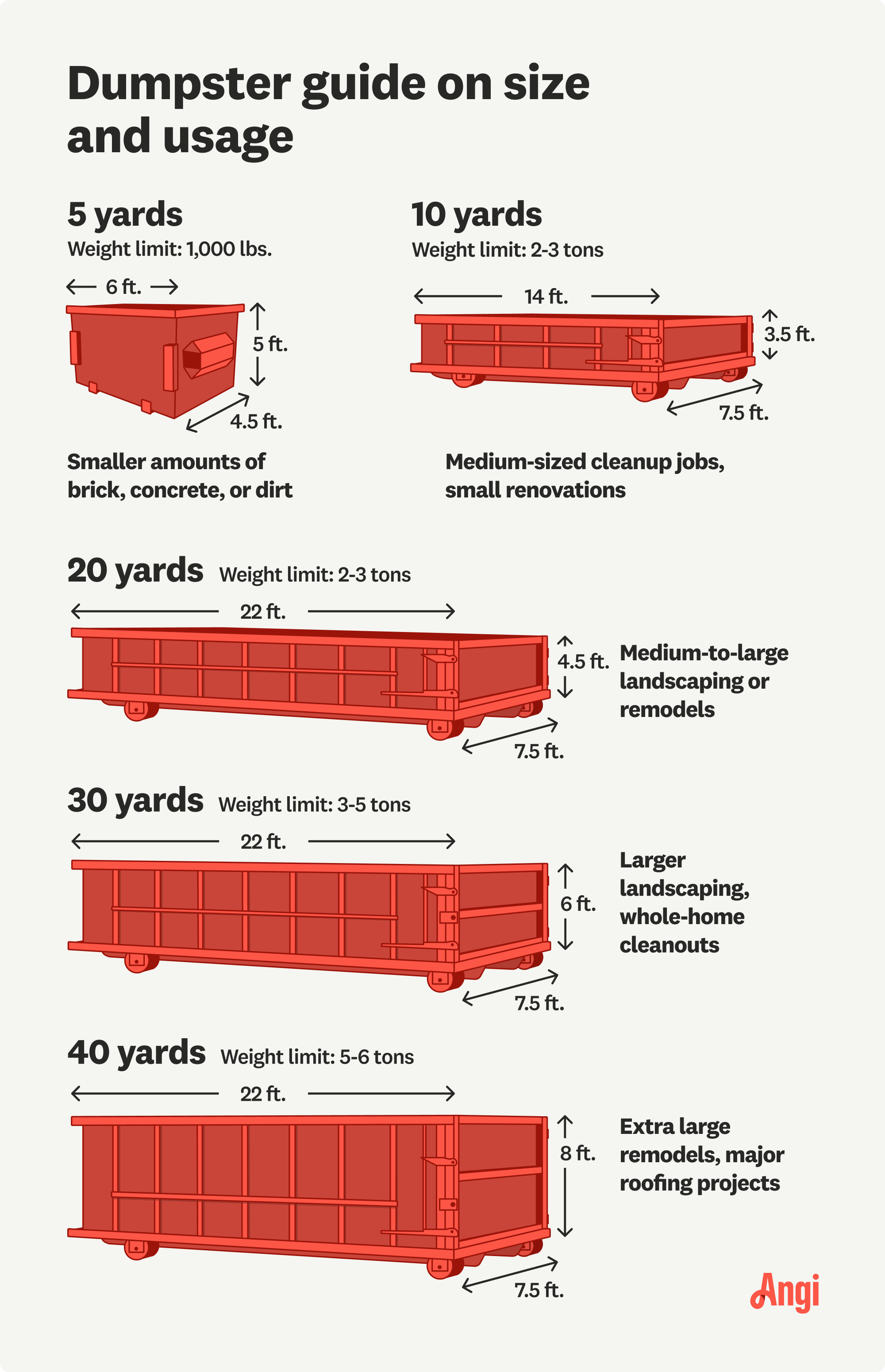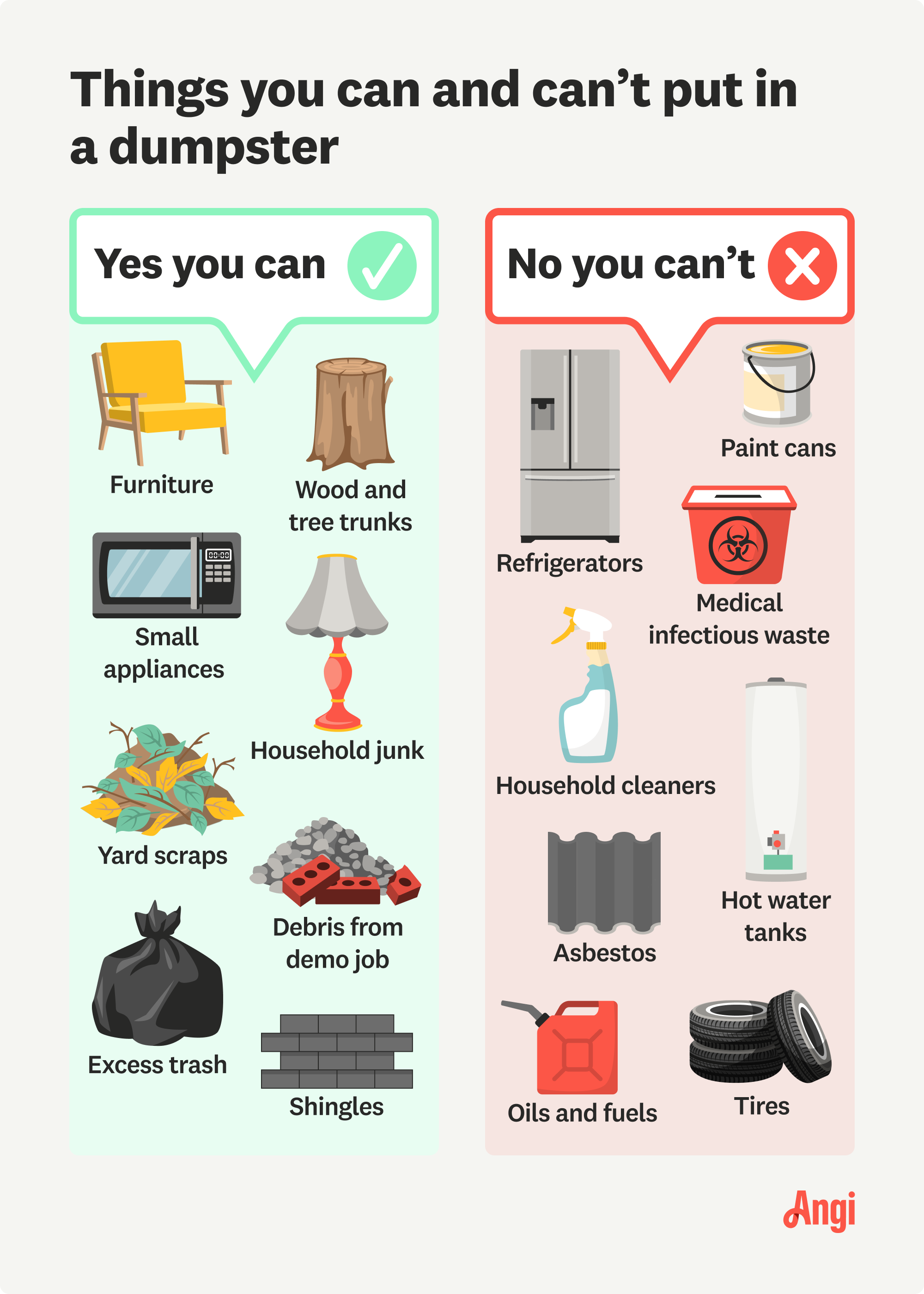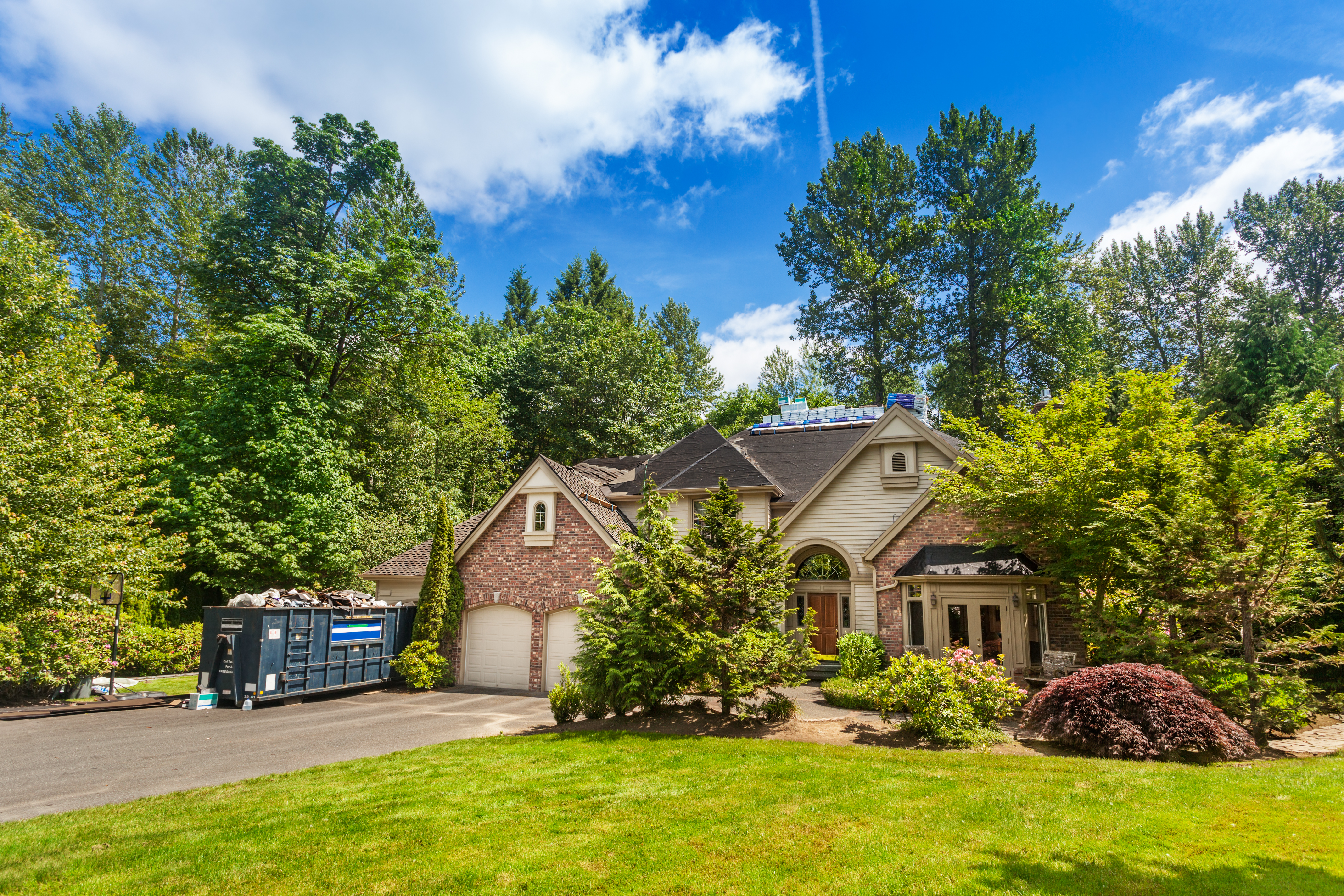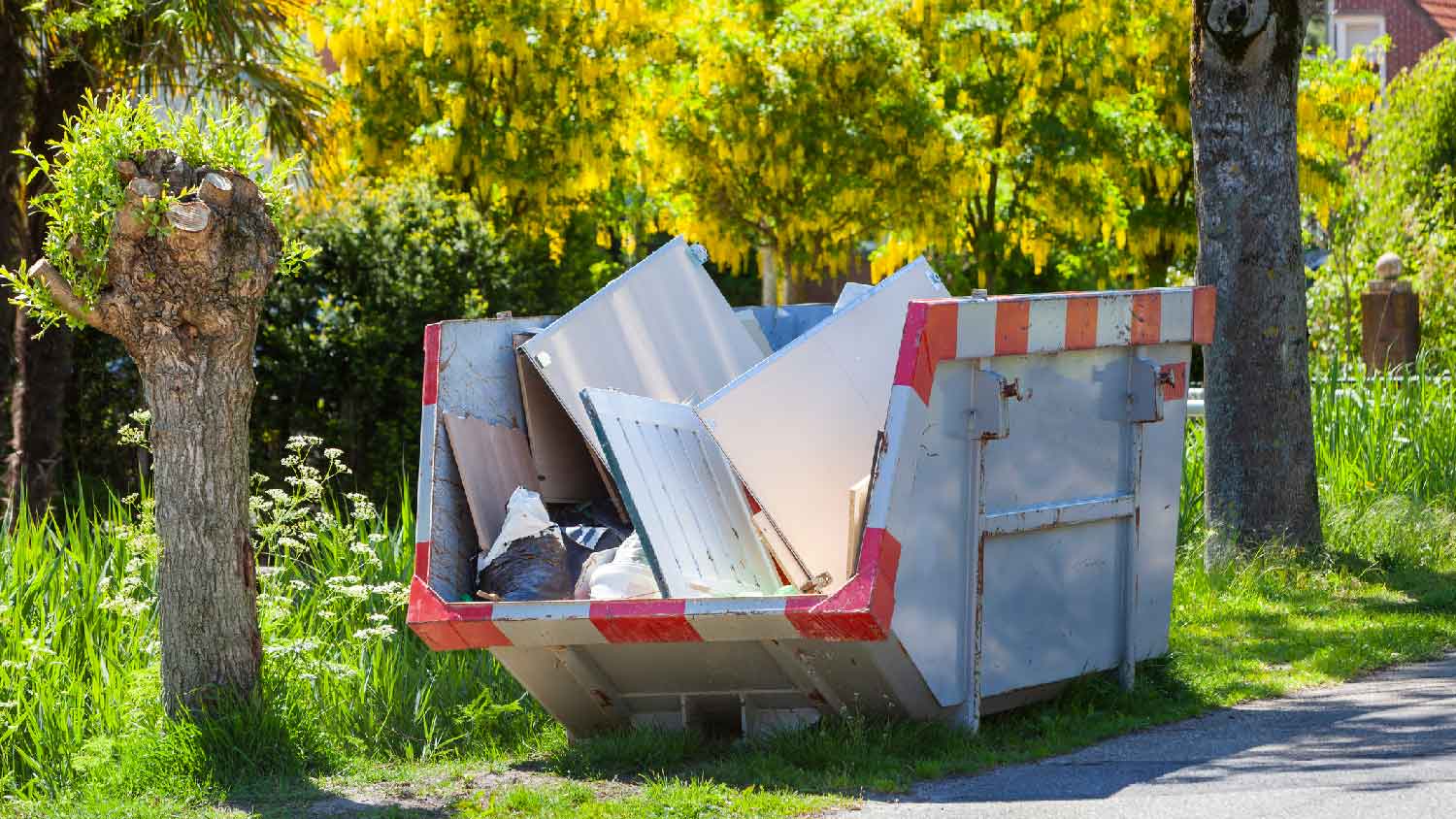
Renting a dumpster allows you to get rid of large amounts of waste. Learn what you can put in a dumpster rental for your next big home project.
We provide accurate cost data by surveying Angi customers about their home projects, along with data from reputable sources and interviews with industry experts.


Most homeowners will spend between $200 and $800 on dumpster rental costs.
The average cost to rent a dumpster is $384.
Rental time will affect your rate; expect to pay $40–$100 for a day, $350–$550 for a week, and $500–$1,200 for a month.
Size and type of dumpster also will affect the price, and so will your location.
The cost to rent a dumpster nationally is $384 on average, but the typical homeowner will pay between $294 and $480. You might get away with paying as little as $200 for a week-long rental of a small dumpster or as much as $800 for an oversized dumpster rental for a week.
Renting a dumpster is more practical than you think—you can use it for smaller projects like cleaning up yard waste, gigantic projects like whole-home renovations, and everything in between. Use this guide to learn how much your rental will cost, the different dumpster types available, and tips to help you save.
Dumpster companies are used to working with both homeowners and commercial clients who approach them with a wide range of needs. Everything from the length of your rental to the type of debris tossed in the trash can sway the price.
Before ordering a standard roll-off dumpster fit for a large home renovation, take a look at the types of dumpster rentals available. Whenever you're in doubt, call your prospective dumpster rental company to explain your project to ensure you choose the best fit.
Here’s a breakdown of dumpster rental costs by type:
| Dumpster Type | Average Cost, Per Week | Best Use |
|---|---|---|
| Roll-off | $300–$800 | Larger projects like remodels or removing furniture |
| Residential | $200–$400 | Smaller projects like home cleanings or landscaping |
| Trailer | $500–$700 | Larger projects like construction, landscaping, or renovations |
| Bag | $100–$200 | Smaller jobs like basement renovations or yard work |

Dumpster sizes typically break down between small residential dumpsters and large roll-off dumpsters. Companies often denote their size in cubic yard capacity and the maximum weight it can hold in pounds or tons.
The smaller dumpsters—such as those that can hold as little as two cubic yards—look a bit like the dumpsters you'd find in the alley behind a small business. They are ideal for simple home renovation projects like ripping up bathroom tile or clearing out a messy garden in the spring.
Consider renting larger dumpsters when you need them to hold literal tons of materials. Removing the rock retaining wall from the backyard or replacing your marble countertops? Opt for the larger dumpster options.
Here’s a breakdown of dumpster rental costs by size:
| Dumpster Size, Cubic Yards | Average Cost, Per Week |
|---|---|
| 2 | $75–$200 |
| 3 | $100–$225 |
| 4 | $125–$250 |
| 5 | $150–$275 |
| 6 | $200–$300 |
| 8 | $225–$325 |
| 10 | $225–$575 |
| 20 | $275–$700 |
| 30 | $300–$725 |
| 40 | $350–$800 |
A 20-yard dumpster is the most common dumpster rental size, which typically costs about $500 to $800. This size is most common because it’s likely to have enough room for a wide variety of projects from large spring cleaning, home remodeling, or new construction. A 20-yard dumpster can fit in most residential driveways, avoiding the need for permits to keep it in the street. Just be aware that having a dumpster delivered on your driveway may cause scratches, cracks, or scrapes in your pavement, as well as needing to find another parking spot for any vehicles.
Ultimately, your needs may vary. It’s usually a good idea to err on the side of renting a larger dumpster than you might need.
The length of time of your dumpster rental will impact the price you pay, too. Most companies don’t offer daily rates but rather charge by the week or month. See the table below for an idea of how much you’ll pay for your dumpster rental based on time:
| Dumpster Rental Time | Average Cost |
|---|---|
| Daily | $40–$100 |
| Weekly | $350–$550 |
| Monthly | $500–$1,200 |
Each dumpster's weight limitation is based on the size—unsurprisingly, larger dumpsters can hold and move heavier weights than their smaller counterparts. And as we learned above, the larger the dumpster you need, the heftier the overall rental cost.
For example, a two cubic yard dumpster can hold about 400 pounds, costing between $75 and $200 per week. On the other end, a large roll-off dumpster has a 40-cubic-yard capacity and can hold between five and six tons, costing you up to $800 each week.
Here’s a breakdown of dumpster rental cost by weight:
| Dumpster Size, Cubic Yards | Weight Limit | Dimensions, Feet |
|---|---|---|
| 2 | 400 lbs. | 6x3x3 |
| 3 | 600 lbs. | 6x4x4 |
| 4 | 800 lbs. | 6x4.5x4 |
| 5 | 1,000 lbs. | 6x4.5x5 |
| 6 | 1,200 lbs. | 6x5x5 |
| 8 | 1,600 lbs. | 6x6x7 |
| 10 | 2–3 tons | 14x7.5x3.5 |
| 20 | 2–3 tons | 22x7.5x3.5 |
| 30 | 3–5 tons | 22x7.5x6 |
| 40 | 5–6 tons | 22x7.5x8 |
Renting the appropriate size dumpster for the weight you’ll be removing is key to avoiding weight overage fees of up to $200. For example, bricks don’t take up a lot of space in a dumpster but are quite heavy. Work with your dumpster rental company to determine the best sized dumpster for your project.
Even if you have all of the permits you need for a construction project, they don’t always cover the use of a dumpster. And even if you’re not undergoing a complete remodeling project, just having a dumpster on your property might warrant a permit, depending on your city and municipality laws.
For these reasons, you may have to obtain a separate dumpster permit, which can run $10 to $100. Check with your municipal building department for more details.
Where you live can affect your dumpster rental cost. While you may not see significant differences, certain locations will have higher prices than others. For example, major metropolitan cities like New York City, NY, and Portland, OR, have higher average weekly rates for dumpster rentals than Jacksonville, FL.
Here’s a breakdown of dumpster rental costs in various locations across the U.S.:
| Location | Average Dumpster Rental Cost |
|---|---|
| Bridgeport, CT | $400–$800 |
| Chicago, IL | $350–$800 |
| Columbus, OH | $300–$750 |
| Houston, TX | $350–$650 |
| Jacksonville, FL | $300–$700 |
| Los Angeles, CA | $400–$1,000 |
| New York City, NY | $500–$1,000 |
| Portland, OR | $650–$900 |
| Sacramento, CA | $500–$900 |
| Saint Louis, MO | $300–$800 |
Many rental companies use an all-inclusive pricing approach, meaning a flat fee includes the drop-off, pickup, standard rental period, and basic disposal costs. However, you’ll want to inquire when getting a quote to ensure there are no additional fees.
These additional costs can kick in if you exceed the weight limit or toss in restricted items. Overweight charges usually run between $40 and $200 per extra ton. If you're getting rid of tricky items, like old appliances, mattresses, or electronics, you could face additional charges depending on the material and local landfill guidelines.
The type of debris you’re disposing of might impact your cost. Some dumpster rental companies will have different rates for construction debris, yard waste, and general refuse.
Hazardous or flammable materials aren’t allowed and require special disposal. Large household appliances may also be restricted, and getting rid of them could mean additional fees or require special disposal services. Always check with your dumpster rental pros ahead of time to know the limitations on the debris you’re dumping.


Several factors influence the final cost of renting a dumpster—some of these costs are included in the rental cost, while other expenses are separate. Here are the major cost factors for a dumpster rental:
| Dumpster Rental Fees | Average Cost |
|---|---|
| Landfill fee | $20–$50 per ton |
| Overloaded dumpster fee | $40–$200 per ton |
| Remote location fee | $0.50–$0.65 per mile |
| Extra day fee | $5–$10 per day |
| Hazardous waste fee | Varies |
| Overflow fee | Varies |
The cost to leave junk at a landfill is known as a landfill or tipping fee. Fees will range on average from $20 to $50 per ton but vary by state and landfill regulations. In many cases, dumpster rental companies will already work the amount into your rate, but in others, you may have to pay the extra cost after they weigh your dumpster and assess specific fees.
Each dumpster has its own maximum weight limit to safely move it from your property to the truck to the landfill. If you exceed this weight limit, you can expect to spend an additional $40 to $200 per ton, even if your debris fits appropriately within the dumpster.
Do you live somewhere that’s more off-the-grid or somewhere that is out in the extreme countryside? If you do, you might be charged an additional fee for the trip out to you to drop the dumpster off and pick it back up. Depending on your location, you might be charged between $0.50 and $0.65 a mile.
Most dumpster rental companies rent by the week or month. If your project exceeds your agreed-upon rental time, you might be charged between $5 and $10 for each additional day you have it.
Hazardous waste materials, like chemicals, asbestos, and batteries, all require disposal at a specialized facility that is different from the traditional landfill that dumpster companies use. Transporting this waste will cost extra in travel and disposal fees, so it’s best to discuss with your dumpster pro upfront if you want to dispose of this kind of waste.
It’s not advised to place hazardous waste materials in your dumpster without first consulting your dumpster rental company. If these items make their way to the landfill, they (in most circumstances) will be returned to you, and you will face a fine of up to $500.
If you exceed the space of your dumpster to where debris hangs over the edges or the top, you might get charged an overage fee (even if you haven’t exceeded the weight limit).
It costs between $200 to $800 to hire a dumpster provider near you, but the price depends on the type and size of the dumpster. Although you can haul off junk yourself, it is not an ideal option for remodels and large landscaping projects, due to the time commitment and the landfill fees.
The time and money you will spend hauling away junk and debris can add up quickly, so here’s why you should hire a dumpster provider pro:
Professionals can recommend the best size and type of dumpster that is right for your project.
They handle delivery and pickup, saving you time and effort from having to take the trash and junk yourself.
The pros know and adhere to regulations regarding waste disposal.
Having a dumpster nearby allows you to dispose of materials and trash immediately, which can reduce the risk of injuries and environmental hazards.
Renting a dumpster can be cost-effective by reducing the number of trips to the landfill.
Depending on the project, you may be able to haul the junk and debris away to your local landfill yourself. Here are some DIY tasks to discard materials for smaller projects:
Create a plan for the items you need to get rid of and organize them by category. (Consider donating and recycling before disposing of materials.)
Contact recycling centers and the local landfill to determine which items they accept and any fees.
Gather the necessary supplies for the task, including garbage bags, gloves, and a large vehicle or trailer to transport the items.
Inquire and comply with all local waste disposal regulations to avoid fines.
Prioritize safety, wear protective gear, and get assistance with heavy items.
Clean up the area once you have removed all the materials and debris.
If you’re renting a dumpster, it's often because you’re in the middle of another, more expensive project. With that in mind, here are some tips to save on your dumpster rental price:
Choose the right size: Calculate the amount of debris you’ll dispose of and consult with your rental company to choose the right size. This helps you avoid overpaying for a larger size or overage fees for a dumpster that’s too small for the job.
Shop around: Get quotes from multiple companies to find a reputable dumper rental service and the best deal.
Ask about discounts: Your dumpster rental company may offer military, senior, and first responder discounts.
Ask for a short-term rental: While many companies charge by the week, ask if they have a cheaper daily rate if you can get your project done in a day or two.
Donate: For whole-home cleanouts, consider donating items like gently used furniture, appliances, and clothing to the Salvation Army or Goodwill to reduce the size of the dumpster you might need.
Consider the season: Since fewer dumpsters are available in the spring due to home remodeling projects and spring cleaning, consider renting your dumpster in the off-season for a potential discount.
Ask the dumpster pro to help you determine what size and type of dumpster is best for your project.
Consult your dumpster pro about local regulations around disposal fees, restrictions, and other rules to avoid potential problems.
Ensure the total quote from your dumpster pro includes delivery, pickup, and rental time.
Home is the most important place on earth, which is why Angi has helped more than 150 million homeowners transform their houses into homes they adore. To help homeowners with their next project, Angi provides readers with the most accurate cost data and upholds strict editorial standards. We’ve surveyed thousands of real Angi customers about their project costs to develop the pricing data you see, so you can make the best decisions for you and your home. We pair this data with research from reputable sources, including the U.S. Bureau of Labor Statistics, academic journals, market studies, and interviews with industry experts—all to ensure our prices reflect real-world projects.
Want to help us improve our cost data? Send us a recent project quote to [email protected]. Quotes and personal information will not be shared publicly.
From average costs to expert advice, get all the answers you need to get your job done.

Renting a dumpster allows you to get rid of large amounts of waste. Learn what you can put in a dumpster rental for your next big home project.

What size dumpster do I need for furniture? It depends on a few factors. Learn more about how to determine the right capacity for your project.

There are several situations where you will need a permit for dumpster rental, especially if it blocks traffic.

Renting a dumpster is an excellent way to clean up during a large project. When you start looking, here are the dumpster rental questions you should be ready to discuss.

Need a dumpster for your project but not sure which type is right for you? Learn about the different types of dumpsters and their uses in this guide.

Illegal dumping comes with many consequences, like environmental damage and hefty fines. Understanding what illegal dumping is can help avoid these issues.